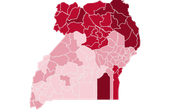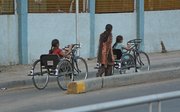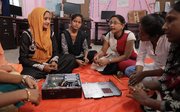What we are working on

Supporting partners to use data for impact
When it comes to understanding poverty and the resources available to address it, our firm belief is that decision-makers and advocates need better access to usable data. Where data is available, technical and institutional limitations to its use persist. From civil society groups to government officials we support access and use of data that can facilitate efforts to promote development, end poverty and improve lives. We provide training workshops, free online tools and a data support service that helps people to access, make sense of, and use data.
Key Projects and Publications
Strengthening Subnational Data Value Chains in Uganda Enabling evidence-informed decision-making at the local level in Nepal
Measuring progress of the poorest people
There is no shared vision or comprehensive methodology for measuring whether the poorest people are benefiting from interventions to help them, or indeed from economic growth. We therefore work to help create the environment and inspire the political will that is needed to achieve better commitments, policies and funding that ensure the poorest people are making progress. This includes deep-dives into nutrition, education and health to provide evidence on what is needed to strengthen human capital and build resilient communities to sustainably end poverty.
► Read more about our work measuring the progress of the poorest people .
Image by Rachel

Counting people and inclusive data
Vulnerable populations are often missing from official data sources, and where data does exist it is not readily available or usable for those who need it. Our work strengthens national data ecosystems across government, civil society and the private sector, focusing on administrative systems, data disaggregation and open data. These efforts are crucial for identifying data gaps and equipping actors to improve decision-making from the local to the global level to help ensure no one is left behind.
► Read more about our work to strengthen national data ecosystems.
Image by Meena Kadri

Gender equality and intersecting vulnerabilities
Some groups of people continue to be marginalised and left behind based on characteristics such as gender, disability or age. These groups are often also impacted by intersecting factors, such as socioeconomic disadvantage, discrimination and unequal access to resources. Lack of robust data, alongside various political and social factors, contributes to the challenges that prevent the needs of all communities being acknowledged and addressed.
The way in which funding is delivered is in urgent need of reform as crises continue to manifest and unfold, driving increasing need across the world. Coherence of policy and financing between the development, climate, humanitarian and peace-building communities at all levels continues to be a challenge that holds back progress. Challenging and transforming underlying systems and structures is essential, not only for a more equitable society, but also a more prosperous and stable one.
► Read more about
our work in this area
Image by
Paula Bronstein/Getty Images/Images of Empowerment
.

Global humanitarian assistance
Humanitarian assistance is intended to save lives, alleviate suffering and maintain human dignity during and after human-made crises and disasters associated with natural hazards, as well as to prevent and strengthen preparedness for when such situations occur. However, lack of transparency, a complex funding landscape, and siloed working means it is difficult to track the resources provided for humanitarian response and ensure they have the greatest impact on people affected by crisis.
Our unique analysis informs decisions and supports accountability efforts to increase the effectiveness and targeting of humanitarian assistance and crisis financing. We bring greater transparency and provide essential information on what funding is available, how it is allocated, who it benefits and what works best to build greater resilience.
► Read more about our work on humanitarian assistance .

Development finance
We know that international aid will not be enough to achieve the Sustainable Development Goals, and we need to mobilise all resources – both public and private – and ensure they are harnessed effectively to tackle poverty and promote inclusive growth. We bring unique insights and greater transparency to international financial flows to support better decisions about the mobilisation and allocation of resources to end poverty.
Image by UK DFID
Global Public Investment: A new way of financing global challenges?
The global financial system is one of the contributors of deep structural inequalities in the world, undermining responses to major global challenges. We need a new, equitable approach to international public finance. As part of the discourse around the global financial architecture reform, Development Initiatives (DI) supports Global Public Investment (GPI), a new approach to unlock more and better funding, based on the principles of ‘all contribute according to their means, all benefit according to their needs, all decide equitably’.
DI is looking to help grow support for GPI globally, and especially within Africa, supporting national organisations to establish plausible use cases for GPI that work for them.
► Read more about our work on Global Public Investment .